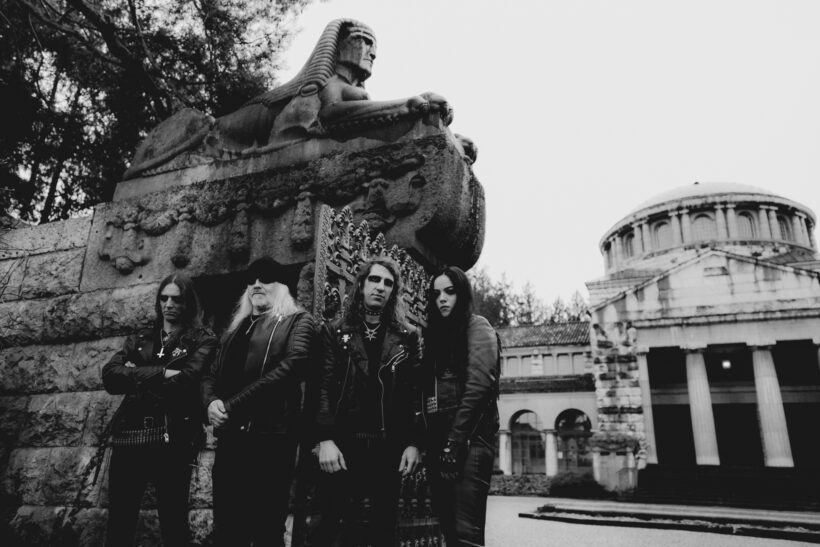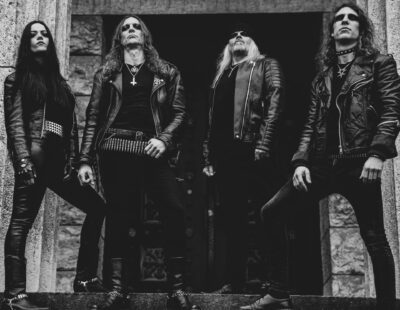
Tom Gabriel Fischer helped build the foundations of extreme metal in the early ’80s and has never stopped creating or innovating. Fischer’s canonical metal works are well-known: the Hall of Fame-certified Celtic Frost masterpieces Morbid Tales and To Mega Therion and Hellhammer’s Apocalyptic Raids (Frost’s Into the Pandemonium would also be there were it not for the untimely passing of Martin Ain).
What has consistently set Fischer apart from his peers – whether in his early 20s or as an elder statesman – is risk-taking. Fischer took risks on every album (even Cold Lake—which he hates—was a risk). His latest risk is perhaps the boldest: resurrecting the music of Hellhammer with Triumph of Death. Hellhammer is the Book of Enoch for extreme metal, so disinterring it is a gamble. But the live TOD album Resurrection of the Flesh—due November 10—breathes life into the music’s four-decade-old bones (and, if you missed it, for which we’re hosting a giveaway of the album with art card and signed 7″!). Fischer talked to us about the album, what’s next for Triptykon, and hope in music.
I haven’t talked to you outside social media since before the pandemic. How did you use that time?
I used the time for rejuvenation. Ever since I reformed Celtic Frost, I have been working, and I realized I was getting a bit tired. I took the pandemic seriously. I’m not a conspiracy follower. Nonetheless, I didn’t have any problems seeing people with precautions. I wore my mask, but I wasn’t afraid to meet people. I adjusted to how the world was changing. When people said it was okay to start touring, I started back up.
Right as the pandemic started, we had Triptykon’s Requiem live album. Roughly three years later, we have a Triumph of Death live album. Is this a coincidence?
I never considered myself good enough for a live album. I was just being realistic. It took 40 odd years to allow myself to be recorded. Since I will die soon it doesn’t matter of I ruin my reputation (laughs). Requiem was a special event and not a typical live album. Some of the rehearsal takes were superior to some of the live performances. We took some of the rehearsal fragments and edited them as necessary. We wanted fans to get the ultimate version of Requiem.
What did people say to you about Requiem? There were a lot of distractions when it came out.
A lot of people talked to me about Requiem. The majority of the feedback was overwhelmingly positive. I don’t take that for granted. It’s not a typical heavy metal record. We worked hard to make it happen, and the work paid off. I was prepared for any reaction. None of my albums are to everyone’s taste. I started with a lot of criticism, so it’s fine. At this stage in my life, I’m extremely aware that I am only here because of the grace of the audience. I am immeasurably grateful for that. I can only thank the audience for allowing me to be a musician for over four decades.
Did you always have it in your mind that you would record Hellhammer songs live?
It was in the back of my mind before Requiem. I wouldn’t touch sacred studio albums that are all around 40 years old. Those came out during a unique time in our scene and in our home country. I knew from the very beginning this was the only way to do it.
How did you produce this recording? The material sounds huge.
I like when albums are produced to a high standard. Some of those ’80s albums are not produced to a high standard. Nonetheless, the recordings capture special moments that can never be repeated. You can produce a better album, but you can’t recapture the spirit and testosterone and even the imperfections that make it so unique. Think about early thrash and black metal – the goal wasn’t perfection but capturing energy.
Hellhammer’s music certainly has that energy and life force.
I’m very careful with Triumph of Death. These songs are sacred to me and my former bandmates. There is sometimes a strange sense of guilt playing the music on stage in any form. Martin (Ain) is dead and Steve Warrior no longer plays. There is always a sense of “am I doing the right thing?” We did not record Resurrection of the Flesh to a high standard. We hardly edited anything. There are a lot of imperfections. We wanted this to be played as Hellhammer would play it. Hellhammer would not have been perfect. Requiem should be regarded as a semi-studio album. The Triumph of Death album is truly live.
I do think this record captures that Hellhammer essence.
That’s important because Triumph of Death teleports you to the early 80s. We’ve tried to recreate the way we performed.
How did you select the 12 songs from the Hellhammer catalog?
There’s not much of a catalog (laughs). This is the set list we are playing and a handful of songs. We might change the setlists in the next few months. We wanted to do the songs we normally do live.
One thing this album does is allow you to showcase these songs properly. They are 40 years old, and many people have only heard them as artifacts.
No one is more surprised at how powerful these songs are than me. You must realize the demos and the EP were recorded on a shoestring budget and on the cheapest equipment. Even with studio recordings, we couldn’t show what Hellhammer could do. We recorded several concerts of these albums before deciding what were the good recordings.
I’m amazed at how well these songs sound, even though they are primitive. There is something about them that still captivates me. There are about two riffs per song, but there is this proto-metal and punk energy that still survives in 2023. Playing these songs is a very emotional experience with a million memories. I would often think about where we were when we wrote these songs.
There is real power in the simplicity.
I am a passionate music lover and always have been. I listen to a lot of prog and jazz and complex music—I bow to it because I can’t do it. But I still love Venom and Discharge and music that is just effective. I don’t think one precludes the other. I peel the layers away so songs are simple, then work on the atmosphere instead of technique. I’m fascinated by simplicity, and it’s not easy. I still work on applying simplicity to music. I love Emerson, Lake & Palmer. Even their music has sections that are simple and work well because of the atmosphere.
When might we expect something new from Triptykon?
As soon as I finish promoting this, we are working on the new album. We are not taking on any plans. We are longing for it as much as anyone else. I have a lot written, and the cover designs are behind me on my wall. We need to develop and record these songs as a band.
Despite the passage of time, you still have this driving passion for music.
I always took my inspiration from the world around me. When I was a kid, there was a daily threat of the Cold War. But there was a sense of hope—that humanity was educating itself. I was trying to write music for the future world. It never arrived, and in some ways, we are descending into a new Dark Ages. That takes away from my enthusiasm for art and life—that we haven’t learned. We still kill each other for religion and there is still racism and we are still killing animals. The list is endless.
It’s like we are reliving the late 1930s on a global scale. As someone who has studied history all his life, it’s scary to see people walking blindly into things we’ve done before. But music is still something that gives you hope. I’m not saying this to be like Bono of U2. I do wish music would have a profound effect on enlightening people. But music can only reach so far against forces consumed with power to the point of murder. Music had the power to change me and save me. That’s much harder on a global scale.





